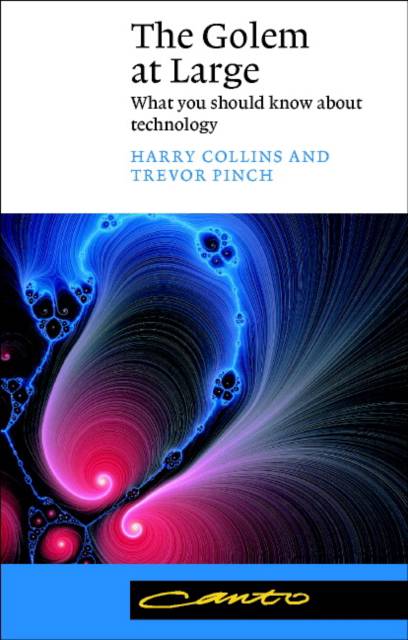
Bedankt voor het vertrouwen het afgelopen jaar! Om jou te bedanken bieden we GRATIS verzending (in België) aan op alles gedurende de hele maand januari.
- Afhalen na 1 uur in een winkel met voorraad
- In januari gratis thuislevering in België
- Ruim aanbod met 7 miljoen producten
Bedankt voor het vertrouwen het afgelopen jaar! Om jou te bedanken bieden we GRATIS verzending (in België) aan op alles gedurende de hele maand januari.
- Afhalen na 1 uur in een winkel met voorraad
- In januari gratis thuislevering in België
- Ruim aanbod met 7 miljoen producten
Zoeken
€ 22,45
+ 44 punten
Uitvoering
Omschrijving
In the widely discussed first volume in the Golem series, The Golem: What You Should Know About Science, Harry Colllins and Trevor Pinch likened science to the Golem, a creature from Jewish mythology, a powerful creature which, while not evil, can be dangerous because it is clumsy. In this second volume, the authors now consider the Golem of technology. In a series of case studies they demonstrate that the imperfections in technology are related to the uncertainties in science. The case studies cover the role of the Patriot anti-missile missile in the Gulf War, the Challenger space shuttle explosion, tests of nuclear fuel flasks and of anti-misting kerosene as a fuel for airplanes, economic modeling, the question of the origins of oil, analysis of the Chernobyl nuclear disaster, and the contribution of lay expertise to the analysis of treatments for AIDS. Anyone who views technology with a wary eye will love The Golem at Large. Harry Collins is Professor of Sociology at Cardiff University and Director for the Study of Knowledge Expertise and Science at the University of Wales. His other books include the forthcoming The One Culture (University of Chicago Press, 2001) and (with M. Kusch) The Shape of Actions (MIT, 1998). nTrevor Pinch is a founding member of the Department of Science and Technology Studies at Cornell University, where he is now chair. He is co-editor (with Wiebe E. Bijker) of The Social Construction of Technological Systems (MIT, 1989).
Specificaties
Betrokkenen
- Auteur(s):
- Uitgeverij:
Inhoud
- Aantal bladzijden:
- 176
- Taal:
- Engels
- Reeks:
Eigenschappen
- Productcode (EAN):
- 9780521012706
- Verschijningsdatum:
- 2/05/2002
- Uitvoering:
- Paperback
- Formaat:
- Trade paperback (VS)
- Afmetingen:
- 137 mm x 213 mm
- Gewicht:
- 249 g

Alleen bij Standaard Boekhandel
+ 44 punten op je klantenkaart van Standaard Boekhandel
Beoordelingen
We publiceren alleen reviews die voldoen aan de voorwaarden voor reviews. Bekijk onze voorwaarden voor reviews.









